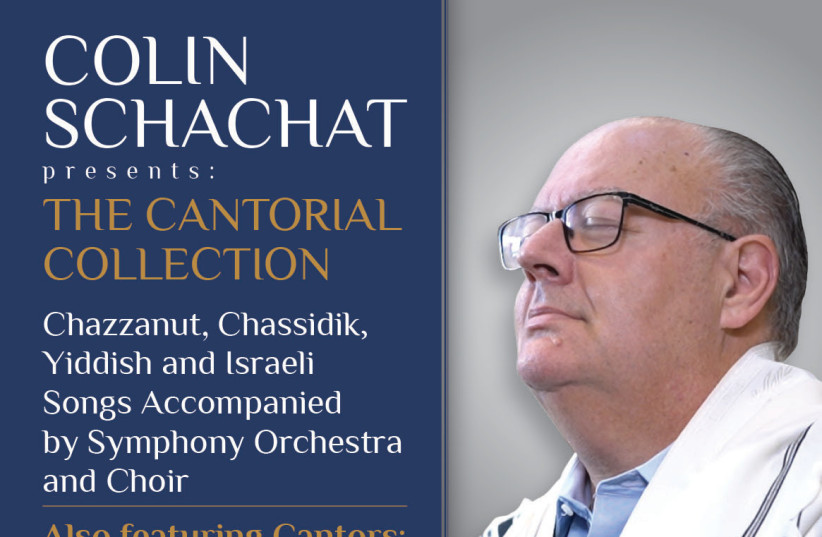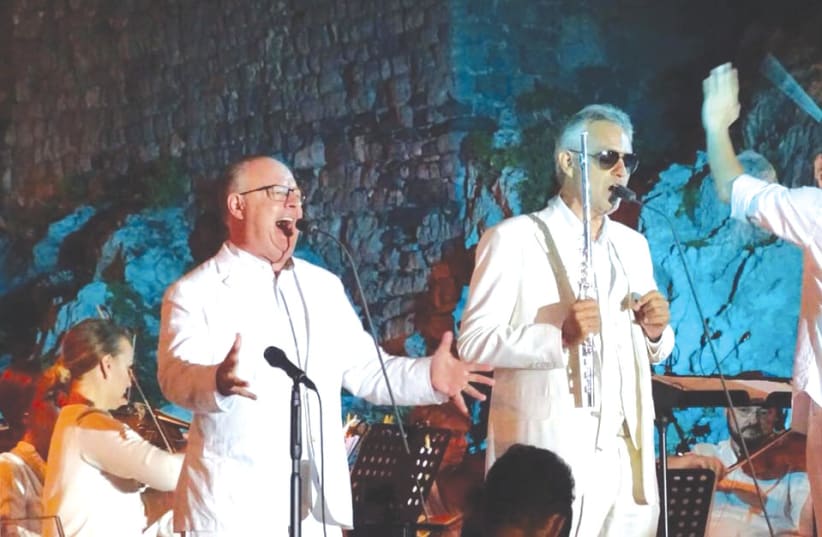
The cantor – or chazzan in Hebrew – was once a standard feature of Ashkenazi synagogues. People used to go to the synagogue solely to hear him, as though it was the voice of the divine in human form. Maybe it was a performance, but one charged with the most elevated of intentions. It gave purpose and reason for being in the synagogue. It made one’s prayers that more meaningful.
This is sadly much less true today. There are chazzanim in synagogues but few are more than part-time. Many of the top chazzanim also sing other than in the synagogue, finding willing audiences in stage performances, opera or musicals.
Colin Schachat one such singer. A lawyer by profession, he nevertheless makes time for the passion of his life – singing.
“I am a concert artist,” he tells The Jerusalem Report. “I started off in the Jewish field, with light cantorial work, and all that goes with that, such as Yiddish songs. Then I moved into more secular work, including a musical theater repertoire.”
Although Schachat performs arias, he does not usually participate in full length operas. But even this is about to change.


“This November, I will hopefully be taking a leading role in the Jerusalem Opera production of La Traviata,” he says. “I was able to prepare for this role because this particular production of the Jerusalem Opera and the Jerusalem Symphony will be done in concert form which means that acting experience (which I don’t have) is not required . Focus is on the singing . I relish the opportunity to express vocal versatility , although I see it as a tremendous challenge.”
With chazzanut, Schachat finds tremendous inspiration but also a professional goal. His rich baritone voice is not necessarily ideal in the world of cantors.
“The standard pieces in the cantorial repertoire are written for tenors, and high tenors at that, with a lot of vocal acrobatics, coloratura and so forth,” he says. “These trills are very difficult for a baritone. There are those who have been outstanding as baritone chazzanim, Laibele Waldman, for example, and the late chief cantor of the Israeli Army, Aryeh Braun, who was a real baritone and yet was a fantastic cantor. I always have to transpose the pieces which are written for the higher voice and bring them down to fit me. When I am asked by younger singers, I always say that one of the keys of success in singing is not what to choose to sing, but what you choose not to sing. Leave out items by which one is exposed, which can be performed better by another 50 singers. You want to do something that you can create with your own personality.”
BORN AND bred in South Africa, Schachat made aliyah some 30 years ago and has since been involved in world of financial services. Yet he has somehow managed to fit in a singing career that has included such highlights as performing with the Royal Philharmonic Orchestra at Buckingham Palace, performances with world class singers and cantors among them Andrea Bocelli, Jose Carreras, Dudu Fisher and Yitzhak Meir Helfgott, and performing with major orchestras both in Israel and beyond. His repertoire is wide, and includes cantorial, Yiddish, opera, oratorio, Italian and Spanish, as well as popular Broadway material.
“When I look back at the various pieces I’ve performed,” he says, “I recall how much fun and enjoyment they were. When I learn a new piece that takes some time I really feel a sense of achievement, more than I do when the accolades wear off.”
Although a religious Jew, Schachat has not found it a barrier, even though he has moved in non-religious environments.
“When you do secular material you also feel a sense of achievement. People see that you are using your talents in an appropriate way, and that you are an integral part of the world of art and culture. You’re not excluded just because you don’t perform on Friday night or rehearse on Shabbat.
“For example, I was singing with Bocelli in a concert that was to take place on Sunday with rehearsals scheduled for Saturday. I spoke to the group we were working with and explained about the sabbath, so they agreed to bring the rehearsal forward to Friday afternoon. It was in Bocelli’s private house. I insisted that I don’t perform, or rehearse, on the sabbath and its non-negotiable. They were completely accommodating. I also told then that I had to leave at a certain time and that was also good. They were deeply respectful of that. They understand that we all have lives other than singing. Singing is important but that’s not the only thing in the world. That was what I taught my four sons, two of whom occasionally perform with me.”
Schachat’s take on fellow cantors can be critical: “The world of cantors is a world of copycats. Which is to say that cantors listen much more to the recordings of other cantors than to the text or the sheet music. They listen and listen and listen and try to copy the original. Which is a pity, because they don’t end up putting their own stamp on the music. One should be creative in your interpretation.”
He attempts to do precisely this on the discs that he has made, including the present one “The Cantorial Collection” which is about to come out:
“In this recording I have gathered together a number of cantorial pieces, some more known some less known, together with some Israeli and hassidic songs. Everyone of the pieces is appropriate for my voice. With one or two I caved into the temptation to sing more familiar tunes. But the real success is not measured by the number of people who hear you, or by the amount of money you earn, but rather by how much you have been successful in using the gift that you have been given from above, for your voice is essentially a bit of godliness that you have been loaned.”
Choosing familiar tunes was not by chance. Schachat is very aware of the limitations congregants put on chazzanim.
“A recent Pew survey found that there were six reasons why people come to a synagogue. Religion was number six! For most, it’s a question of social meeting or nostalgia. When it comes to singing people want familiar stuff, they want to hear what they heard as kids, and they want their children to do the same. I’ve had a policy that every single Rosh Hashanah I will always introduce one new niggun (tune). Last year I introduced a beautiful new niggun for Hayom Teamtzenu from Modzitz hassidim. It was a special Covid minyan. I knew it would be difficult to sing along with so I sent a YouTube of it beforehand and told people if they wanted to sing along they should learn it. I’m glad to report that they took it very seriously and when it came to the prayer they sang along.”
Schachat credits his father for inspiring him.
“I produce a cantorial CD every five or ten years to mark the anniversary of my late dad’s passing. He was my inspiration even though he did not sing, he gave me the opportunity to develop my singing. He loved chazzanut, but he would ask me: ‘Why do you have to use the most difficult pieces? No one wants to hear them. Choose something simpler.’ I tried to explain that I like to be challenged. In the past I shied away from real cantorial works, but this time I thought I’d really have a go at something authentically cantorial. I think they are songs that people can really learn.
“So I chose very carefully. It took me months to chose from something like a thousand potential pieces. I came out with a mixture. It includes a lovely Israeli song – ‘Ani Guitara’ (I am a guitar) by Naomi Shemer. It’s probably been recorded many times, but never without a guitar! I thought it was a very moving work, it’s poetry. It’s about a guitar but it’s allegorical, a reference to the soul and its a dialogue between a man at the end of his life. I was moved by the profundity of it all. It was not just another song. Shemer wrote it specifically for Benny Amdurski (who was suffering from terminal cancer) and he was a baritone. It’s really a classical Israeli song with such a spiritual overtone.”
Schachat believes that cantors contribute enormously to synagogue prayers but somehow don’t enjoy the popularity they once had.
“The point is that because most communities, both in Israel and to an increasing degree abroad as well, do not employ full time or even part-time cantors when they do engage a chazzan for a special Shabbat they often try to condense so much material into that prayer service that it becomes self-defeating,” he says.
“I have great personal and professional respect for the cantors of today (many are close friends), but lament the sad state of the profession and the demise of the once hallowed position of cantorial clergy,” Schachat concludes.
